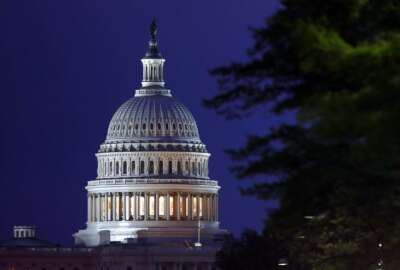
How did Congress move so fast on that Juneteenth law anyhow?
A crucial week's ahead for Congress. Democrats say they'll go to reconciliation to pass a $6 trillion package, if Republicans don't go along.
Best listening experience is on Chrome, Firefox or Safari. Subscribe to Federal Drive’s daily audio interviews on Apple Podcasts or PodcastOne.
A crucial week’s ahead for Congress. Democrats say they’ll go to reconciliation to pass a $6 trillion package, if Republicans don’t go along, as regular government operations are likely to head to a continuing resolution. Federal Drive with Tom Temin got the latest from WTOP Capitol Hill correspondent Mitchell Miller.
Interview transcript:
Tom Temin: And Mitchell, let’s talk first about that infrastructure – whatever that means – package, and what’s likely to happen. This is coming to a head, isn’t it?
Mitchell Miller: It really is and it’s amazing the amount of money that we’re talking about, potentially up to $6 trillion that Senate Democrats are now considering. This would essentially be their plan B if the much more modest, roughly $1 trillion, bipartisan infrastructure plan fails to move forward. That plan currently has enough Republican support, by the way, more than 10 GOP lawmakers to move ahead in the Senate. But as you know, there are a lot of progressive Democrats who are complaining it doesn’t go far enough. They want to go big and bold. I spoke with Virginia Senator Mark Warner, who’s a more moderate democrat last week, and he raised concerns about progressives trashing the bipartisan plan that he’s been a part of. So as for the $6 trillion plan, it would essentially fold together the two parts of President Biden’s American Jobs Plan and the American Family Plan. The jobs plan is the one that more closely aligns to what Republicans want, which is roads, bridges, water- that type of thing – whereas the American Family Plan goes much broader in a variety of directions, including daycare, pre-K, also talk about expanding Medicare. Many Democrats say that they are considering actually trying to expand Medicare to drop it down to the age of 60 for eligibility, but many of the more moderate Democrats still have a lot of doubts about the cost of this. So we’ll have to see where it goes. Because for them to get the 50 votes they need for reconciliation is still pretty much a work in progress.
Tom Temin: Well, I think the administration understands that when it comes to infrastructure, daycare, and Medicare don’t need environmental impact statements.
Mitchell Miller: Right, exactly.
Tom Temin: They can actually get built, unlike, say, the widening of I-270 or something here in the D.C. area, and that could be tied up for the next 20 years. So what would happen, then, if the talks break down, then there would be a reconciliation type of vote. But if all of the Democrats aren’t in favor of it in that $6 trillion form, then maybe that wouldn’t pass either?
Mitchell Miller: Right, it’s sort of a situation where politically be careful what you’re wishing for, because frankly, a lot of Democrats on the progressive side would like the bipartisan talks to just sort of fall apart. And then they would say, okay, now we really only have one choice, we have to go to reconciliation. But a lot of other Democrats and I also talked to Virginia Sen.Tim Kaine – he’s still waiting on whether or not this bipartisan plan will come through. But he along with others basically say, we’ve got to have this reconciliation plan in our back pocket. Now saying you have it in your back pocket is one thing, actually getting it passed, as you said, is a much different thing. I mean, there’s been a ton of talk, of course, around West Virginia Sen. Joe Manchin and what he would do, but also more quietly behind the scenes, there are a lot of senators still that have some questions about a lot of these proposals that are bundled into this $6 trillion package and whether it would actually be $6 trillion. So they are going to have to get all 50 of them on board, if they’re to have any chance to get it through. And then there are some questions still lingering more deeper in the weeds about what the parliamentarian in the Senate would say, in connection with some of these proposals. But right now, it’s basically what they’re saying is a two track process. They want to try to see if this bipartisan plan, if it’ll work. And if it doesn’t, then Democrats say they’ll go to reconciliation.
Tom Temin: And meanwhile there is that sliver of spending that represents the discretionary budget, a mere $1.5 trillion for operation of the government. And that looks like it’s not going to happen, as per usual.
Mitchell Miller: No, that’s another interesting thing that’s changed. The Biden budget, essentially, the rough outline for spending didn’t really come out until May. So lawmakers on the appropriations and budget committees acknowledged they’re really in very early talks for this stage of the summer getting underway. Alabama Sen. Richard Shelby, the top Republican on the Appropriations Committee, he told Politico last week he does not see any possibility that Congress is going to meet the Oct. 1 deadline. He says there’s been a lot of talks back and forth, and a lot of other lawmakers have suggested that they’ve had talks. Again, I’ve been talking with Sen. Tim Kaine, who’s a member of the budget committee. So it’s not as if nothing is happening, but it’s clearly not happening as quickly as it normally does. So I think as we get close to that Oct. 1 fiscal date, we’re likely to hear those words like stopgap and continuing resolution once again, as we have for many many years.
Tom Temin: We’re speaking with Mitchell Miller, Capitol Hill correspondent for WTOP. And there’s going to be a hearing in the Senate on an issue that could make federal commuters interstate commuters.
Mitchell Miller: Yes, the Senate Homeland Security Committee is going to hold a hearing tomorrow on statehood legislation. D.C. again, of course trying to become a state. Eleanor Holmes Norton, the D.C. delegate will be speaking at that hearing. Now, the House, of course has already passed this legislation, Eleanor Holmes Norton trying to build momentum on the Senate side, obviously a long, long way for this to go. But supporters of statehood really hope that this will again raise the profile of the issue, which has not really received a lot of attention in the Senate over the years. The house has had a lot of activity related to it. They’ve had hearings in the past about this, but this will be a really different type of hearing for statehood supporters so they’re really frankly pretty excited about it. Now, on the downside for statehood, of course, the Senate is where statehood goes to die because Republicans have made it very, very clear that they will not support anything like this. They don’t want the chance of another two senators who would likely be Democrats. So nonetheless, Democrats look to the fact that in the Senate, they do have roughly 40 co-sponsors, which is pretty high for them, but they still have a lot of work to do there. Once again, the name Joe Manchin, the West Virginia senator, among those who’s in the middle of this. He recently indicated that he could potentially support statehood. So gradually, statehood supporters say they’re continuing to build block by block their case for trying to get it down the line.
Tom Temin: Yeah, and there’s no talk then of annexing D.C. to say Takoma Park otherwise.
Mitchell Miller: Right. I mean, there’s occasionally though, on the floor debate, you’ll hear a lawmaker say, hey, why doesn’t Maryland just take back D.C.? And then the people from D.C. push back very hard. So it’s interesting to watch the dynamic because, as you well know, the regional back and forth between Maryland, Virginia and D.C. all come together and of course, we’ve had years and years of talks about the commuter tax that was a big stumbling block for supporters of D.C. statehood for a long time. And in fact, it wasn’t until relatively recently that House majority leader Steny Hoyer actually came on board with supporting statehood in recent years.
Tom Temin: All right. And just by the way, this holiday suddenly popped up on Friday, Juneteenth, and became – well Juneteenth actually was Saturday – but Friday became a federal holiday. And I had people cancel interviews, because I’m not going to work today. How did that happen so fast? I’m still scratching my head.
Mitchell Miller: Yeah, that was really remarkable. I mean, even by congressional standards, what triggered it was a change involving of all things Wisconsin Republican Sen. Ron Johnson. Now you think what does he have to do with Juneteeth, which of course the origins is in Texas, but he for a long time had objected to unanimous consent motions that would add Juneteenth as a federal holiday. And as you know, in the Senate, it only takes one objecting lawmaker to stop things in its tracks. So he had stopped this for a long, long time. And then all of a sudden, on Tuesday, he finally after years of saying that he didn’t want this for a lot of familiar reasons that people have opposed federal holidays in the past saying that it’s going to lower productivity that federal workers won’t be on the job, etc. He finally just said, you know, there’s so much support on both sides of the aisle that he would withdraw his objection to it. So again, as you know, the Senate can move very quickly when it wants to, it can move very, very slowly on other issues. But once unanimous consent was passed, then boom, it went through on Tuesday evening. And then the House said, well, we’re going to take this up right away. And they did. And on Wednesday, the House took it up with a relatively short debate. There were some objections, some from Republicans, again, about the taxpayer issue, also some issues about what it was called. And then some people just said they wanted more regular order that it should have gone through committee, but obviously, it went through the House very, very quickly. And then the next day, President Biden signs it into law, a lot of people wondering a lot of federal workers wondering, well, what does that mean? Does that mean it’s going to happen right away, and sure enough, the White House, they issued – the administration issued a statement saying yes, this is going to go into effect on Friday. So low and behold, we had this all happened within just basically about 72 hours.
Tom Temin: Yeah, the elephants and the donkeys can dance together, as you say when they really want to.
Mitchell Miller: That’s right.
Tom Temin: Quite a sight that is. Mitchell Miller is Capitol Hill correspondent for WTOP. As always, thanks so much.
Mitchell Miller: You bet.
Copyright © 2024 Federal News Network. All rights reserved. This website is not intended for users located within the European Economic Area.
Tom Temin is host of the Federal Drive and has been providing insight on federal technology and management issues for more than 30 years.
Follow @tteminWFED





